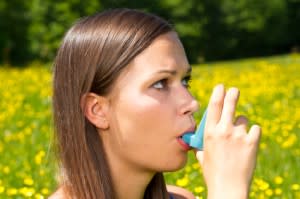The Link Between Allergies and Asthma
We’ve written previously about the increasing rates of allergies and how climate change is making this epidemic worse.
What you may not know is that cases of asthma have also been rising. Currently, 26 million people across America suffer from asthma, and a new study shows that nearly two-thirds of these people also have allergies.
As most of you have already experienced worsening spring allergies, you know how tough it can be, even if you don’t have a complication such as asthma.

Doctors have long known that allergies and asthma often occur together in children and that people with allergies are particularly susceptible to asthma. This new study finally shows how prevalent allergies are in asthmatic adults. Specifically, 75 percent of 20-40 year olds and 65 percent of those aged 55 and older have allergies on top of their asthma.
In the link above, Dr. Weber, the president of the American College of Allergy, Asthma, and Immunology (ACAAI), explains that we may be living at the time of a perfect storm for allergies and asthma. The two could be linked together and rising together due to the hygiene hypothesis and climate change.
Another reason for the rise in cases may be better education and awareness leading to more diagnoses. In fact, while the reported rate of asthma in adults is around 3-7%, it might actually be much higher, since many older adults with respiratory diseases may have never been officially diagnosed. Also, some adults may think that they have outgrown childhood asthma only to have a surprise attack later in life.
Asthma can be triggered by various means in different people, from exercise to cold air to stress. For some people, there may be specific allergy triggers that also stir up asthma, causing shortness of breath, tightness in the chest, and wheezing.
While most treatments target either asthma or allergies, there are a few that can help with both if the reactions and symptoms are linked. Allergy shots may able to keep both symptoms under control. If you don’t like shots, try oral drops instead. A recent review study found that oral drops work just as well as shots when it comes to reducing symptoms in children such as coughing, wheezing, sneezing, itchy eyes, and runny noses.
